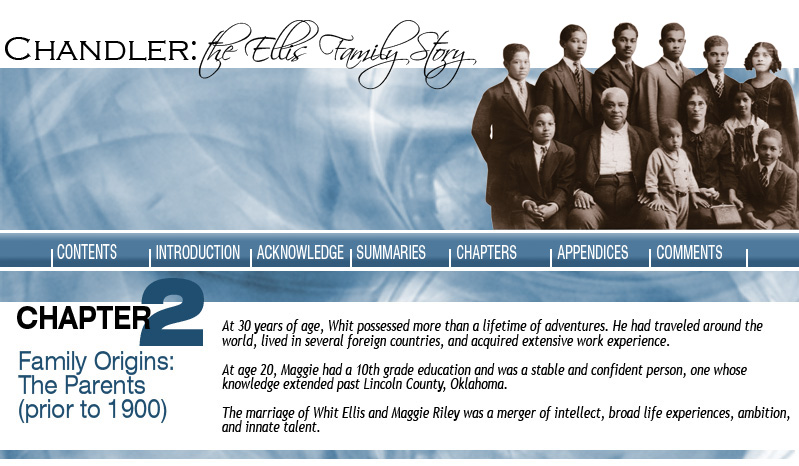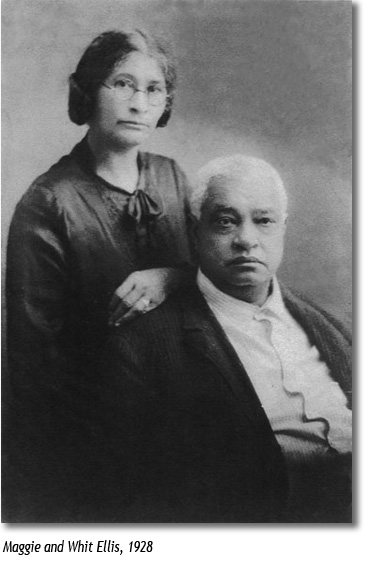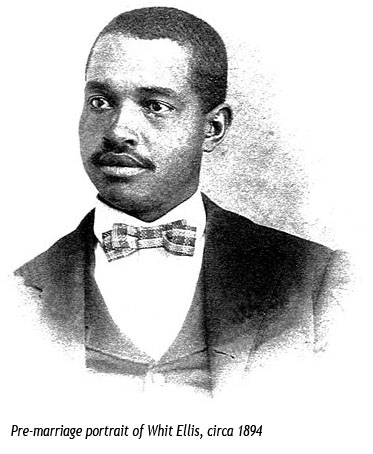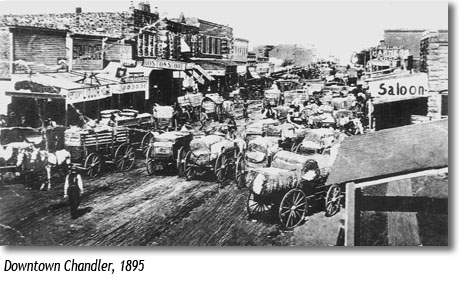
|
On September 26, 1870, Whit Ellis (born Whitfield Washington) was born in Sumter County, Alabama. Although little is known about his early childhood, the 1880 Alabama state census indicates that Amanda Washington and her two sons, Frank (12 years old) and Whitfield (10 years old), were living in Sumter County in an area referred to in census documents as “Faros Beat.” In the early 1900s, after marrying Maggie Riley, Whitfield shortened his first name to “Whit” and changed his last name to Ellis. The reason for this change will be discussed later.
According to his older brother, Frank Washington, Whitfield was always much larger than other children his age. Frank related that Whitfield had attained the physical maturity of a grown man by the age of 14, standing a giant six feet, three inches tall and weighing more than 230 pounds. In that post-Civil War era, the average male adult was five feet, seven inches tall and weighed between 140 and 160 pounds. In local circles, Whitfield was renowned for his incredible physical strength. Even in his childhood he performed manual labor alongside adult men. He worked primarily on construction projects, often as a hod carrier, delivering heavy loads of cement or bricks to bricklayers. The Death of Two White Men and Escape From the United States During the mid-1880s, Grandpa Ellis was forced to make a survival decision. Still in his early teens, he was working in Ensley, Alabama, just outside of Birmingham. A disagreement between Whitfield and several white men escalated into a violent confrontation resulting in the deaths of two white men. Details on the incident are unknown. What we do know is a frightened black teenager recognized his life was in grave danger for his mere presence at a scene where white men had been killed. He felt compelled to flee the inevitable lynch mob that would be organized after such an event. Whitfield frantically sought his brother for advice, and Frank confirmed that immediate escape was Whitfield’s only chance to remain alive. The 14-year-old child with the body of a man left his home and family and headed south toward the Mississippi Coast. The consensus in our family is that heading south was key to his successful escape. Most black people in a similar situation would have sought refuge by heading north, but Whitfield made his way south to Mobile, Alabama. After arriving there, he was hired as a galley cook working on an international trade ship. Whitfield followed the sea for several years. His travels took him around the world. He spent time in Jamaica and on the West Coast of Africa. At age 16, Whitfield Washington landed in the Caribbean Islands where he lived for several years. Although still fearful of his fugitive status, he returned to the United States before his 20th birthday. Ultimately, Whitfield traveled to Oklahoma. His initial location was in the Spavinaw Hills, a popular place for those avoiding the law. Sometime in the early 1890s he arrived in Guthrie, capital of the Oklahoma Territories. In Guthrie, Grandpa Whitfield did two things. First, he changed his name from Whitfield Washington to Whit Ellis. We speculate he did this to avoid further pursuit by the law. However, we wonder why he didn’t assume a new first name as well. Second, in 1894 Whit opened his first business venture — the Monrovia Restaurant, named after the city of Monrovia, Liberia, one of Grandpa’s favorite places visited during his travels. More details on Grandpa Whit’s first business are in Chapter 5. At a young age, Whit Ellis was a worldly person. Before his 30th birthday and his marriage to Maggie Riley, he had traveled extensively in the United States and throughout the world and accumulated money and global business experiences. This was an extraordinary personal profile in an era when many Americans, black and white, spent their entire lives without ever leaving the counties in which they were born.
We know little about the early life of Maggie Riley. She was born on August 25, 1880, in Dallas, Texas. Her father, a wagon repairman named James Boldukes, was killed in an accident when Maggie was four years old. Maggie Riley remembered her first days in the bustling town of Chandler. The streets were crowded with wagons arriving from all parts of the country. There were no hotels, one businessman solved this problem by constructing a series of “bookshelf” sleeping accommodations. Each shelf provided sleeping space for one person in a makeshift hotel built under a large tent that was constantly crowded with new arrivals.
Around 1896, the Riley family bought a 20-acre farm a mile and a half southeast of Chandler. From 1891 to 1897, Maggie attended an integrated school with both white and Indian classmates. At this time she became a good friend of a white girl with the last name of Hoyt. The Hoyt family owned the adjacent 40-acre farm. When the massive tornado hit Chandler in 1897, it destroyed the entire downtown area of the city, and permanently traumatizing Maggie and Ann Riley. For the remainder of their long lives, both carried a dreadful fear of anything that resembled a tornado. This included being fearful at the slightest suggestion of lightning, heavy clouds, or a strong wind."Better safe than sorry" was the response to the many complaints of their children as the smallest weather disturbance forced them into the storm cellar. In 1898 and 1899, Maggie Riley attended high school at the newly opened Colored Agriculture and Normal University at Langston, Oklahoma. At that time, “Langston,” as it was always called, was the only place in the state for blacks to continue their education after the 8th grade. In 1899, Maggie Riley met Whit Ellis and fell in love. They were married in 1900, ending Maggie’s academic career after she completed the 10th grade. For the next 40 years, she devoted her life to raising the 10 Ellis children. She was a major influence in forming the personality of each child. Her approach for dealing with life, more than that of anyone else, is overwhelmingly visible in each of her children. Maggie and Whit brought rare attributes to their marriage seldom found among any Americans, black or white. Whit had traveled around the world, lived in several foreign countries, and was an experienced businessman. That Maggie had completed the 10th grade was an unusual accomplishment for a woman of her time. The backgrounds of their parents and grandparents provided the Ellis children with an atmosphere where curiosity, trying new things, and thinking about the “larger world” were encouraged. The Ellis children were nurtured in an open environment. Their interests exceeded the narrow boundaries of only those things that they could see and touch. They became independent and creative, and they dared to ask, “What if?”
|
||


